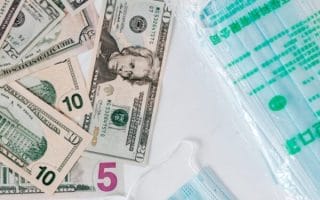
The simple trick to making money at McDonald’s Monopoly is not to play. The actual odds of winning any prizes worth significant value are extremely slim (your best chance was actually with the pre-promotion sweepstakes), but providing a service to those who are committed players can be an excellent opportunity to make a little extra money. If you are wondering how much money a person can make by doing this, last year a reader reported making over $1000 from the game. So, how can someone make several hundred dollars off the McDonald’s Monopoly game? With a well thought out plan, and understanding the dynamics which cause people to pay for game pieces.
Understanding the Odds
One of the main reasons games like McDonald’s Monopoly are so successful is the majority of people have little understanding about how the odds of the game work. Not understanding the odds, people playing to win a prize will usually collect game pieces backwards. In other words, instead of trying to collect just the rare pieces, they try to collect all of the pieces.
The most logical approach to winning at this game is to try to collect a rare game piece. Once you have the rare piece, you can then get the common pieces to fill out the property set with relative ease on your own or through other means such as from friends, eBay or Craigslist. There is no reason to go out and spend money getting common pieces until you have a rare piece in hand.
This, however, is not how most people approach the game. Most people set out trying to collect as many game pieces as possible. This way, if they manage to get one of the rare game pieces, then they will already have the other property pieces needed to win. As a result, people end up overpaying for common property pieces when trying to fill in as many blank game pieces as they can on their boards.
Selling Pieces
One way people make money off this game is selling the pieces they collect on websites like eBay and Craigslist. The strategy tends to work best in the early days of the contest when those who don’t understand the odds scramble to fill up as much of their board as they can. Game pieces can sell for several dollars when there happens to be a bidding war for even common pieces. Most are listed in the early days for $1 or more.
Even as the game progresses, it’s still possible to make money selling game pieces for the online codes. These are often sold for $0.25 or more each, so if you’re able to get hold of a lot of game pieces, you can earn quite a bit this way. Most people who make money off the game do so by collecting as many pieces as they can and selling them to others.
Selling Instant Win Prizes
Even more lucrative than selling the common property pieces and online codes is to sell instant win prizes. You can eat those medium fries yourself, or you can sell the game piece to someone else who will use it. Most times, the prizes sell for about 50% of their retail value, but for those who collect a lot of game pieces, they’re sure to come across these instant win prizes as well which can be sold for money.
Inserting Codes
This is a new way that at least one person is making money off of the game who emailed me to tell me about it. Apparently there are some people who want to say they have won the online game prizes, but don’t want to be bothered with the time it takes to input the codes into the online portion of the game. The person does the full service for these people. He collects the game pieces and inserts the codes for them under their account, and they keep any prizes they may win. He charges $1 per code entered, and claims he’s making $50 a day doing this for several people.
The key takeaway from this is that the way to make money off of McDonald’s Monopoly is not to play the game yourself, but to provide a service which makes it easier for those who do play the game. Doing so can put some extra spending money into your pockets each year the game comes around.
Jeffrey strain is a freelance author, his work has appeared at The Street.com and seekingalpha.com. In addition to having authored thousands of articles, Jeffrey is a former resident of Japan, former owner of Savingadvice.com and a professional digital nomad.





Comments